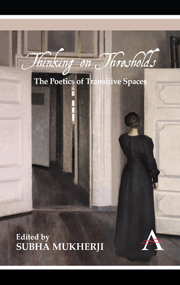Book contents
- Frontmatter
- ACKNOWLEDGEMENTS
- Contents
- List of Illustrations
- Notes on Contributors
- Introduction
- Part One Doors, Windows, Entries
- Part Two Lives and Narratives, Territories and Worlds
- 5 Unsettling Thresholds: Mignon and Her Afterlives
- 6 Dangerous Liaisons: Desire and Limit in The Home and the World
- 7 Writing Through Osmotic Borders: Boundaries, Liminality and Language in Mehmet Yashin's Poetics
- 8 Dancing and Romancing: The Obstacle of the Beach and the Threshold of the Past
- Part Three Matter, Mind, Psyche
- Part Four Reading, Writing, Playing, Listening
- Select Bibliography (including Discography)
8 - Dancing and Romancing: The Obstacle of the Beach and the Threshold of the Past
from Part Two - Lives and Narratives, Territories and Worlds
Published online by Cambridge University Press: 05 March 2012
- Frontmatter
- ACKNOWLEDGEMENTS
- Contents
- List of Illustrations
- Notes on Contributors
- Introduction
- Part One Doors, Windows, Entries
- Part Two Lives and Narratives, Territories and Worlds
- 5 Unsettling Thresholds: Mignon and Her Afterlives
- 6 Dangerous Liaisons: Desire and Limit in The Home and the World
- 7 Writing Through Osmotic Borders: Boundaries, Liminality and Language in Mehmet Yashin's Poetics
- 8 Dancing and Romancing: The Obstacle of the Beach and the Threshold of the Past
- Part Three Matter, Mind, Psyche
- Part Four Reading, Writing, Playing, Listening
- Select Bibliography (including Discography)
Summary
I ask myself what past historians of the castaway state have done – whether in despair they have not begun to make up lies.
Keith Thomas's latest book, The Ends of Life, ends with a couplet taken from Dryden's Horace:
Not Heav'n itself upon the past has pow'r,
But what has been has been, and I have had my hour.
In her review of his book Hilary Mantel, winner of this year's Man Booker Prize for a splendid historical novel based on the life of Thomas Cromwell, had this to say about his quotation:
As a comment on a career, this is graceful; as comment on the discipline to which Thomas has devoted himself, it is not quite true. Historians can do what heaven cannot: for all practical purposes they can change the past behind them…We understand the past in the light of evidence we select…It is not only the voiceless workers of England who have been subject to what E. P. Thompson famously called ‘the enormous condescension of posterity;’ it is our ancestors as a class, made fodder for theories.
When someone fresh from inventing a fiction based on history makes this sort of remark it is interesting to probe it. Does Mantel silently admit there was a time before theories when historical evidence was proof against selection and ancestors immune to the condescension of their posterity; an era when history was as self-evident and inevitable as Thomas suggests?
- Type
- Chapter
- Information
- Thinking on ThresholdsThe Poetics of Transitive Spaces, pp. 113 - 128Publisher: Anthem PressPrint publication year: 2011



